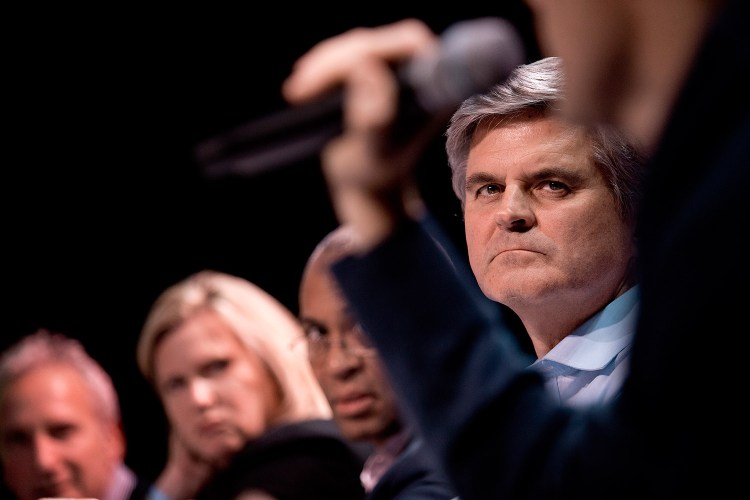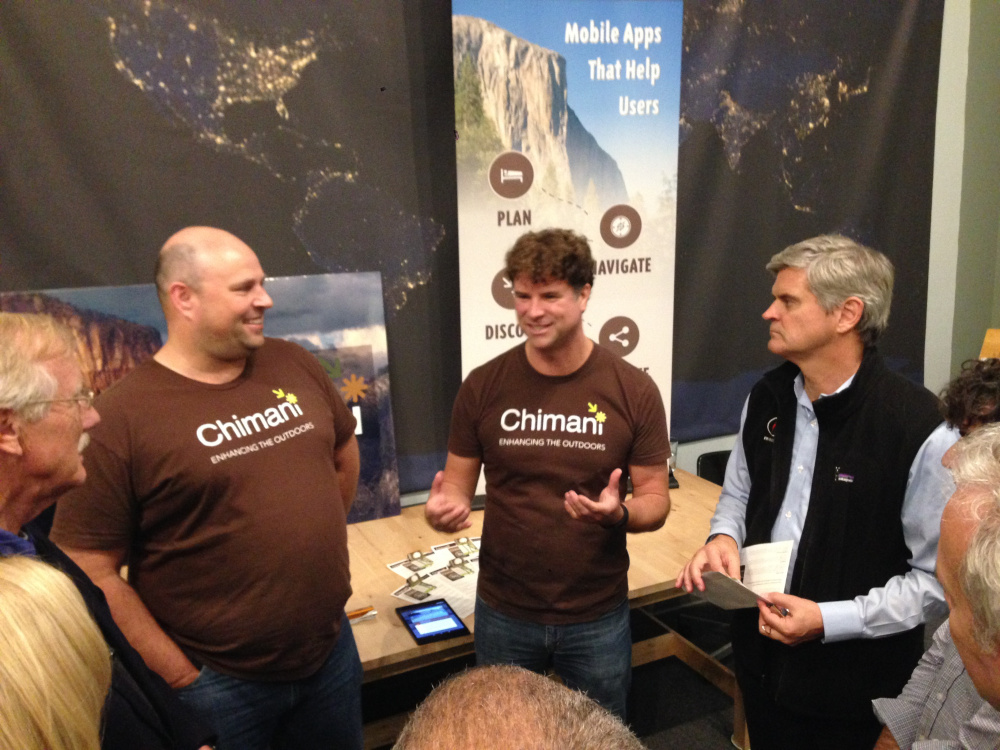Rapport, a startup company in Portland that develops software to track sustainability, walked away with a check for $100,000 from AOL co-founder and billionaire Steve Case in an event that capped a daylong celebration of entrepreneurship in Maine.
Case, who is currently CEO of Revolution LLC, a Washington, D.C.-based investment firm, was in Portland on Friday as part of his Rise of the Rest tour, a series of visits to highlight the burgeoning startup communities that exist outside Silicon Valley. His visit to Maine culminated with a pitch contest at Port City Music Hall with eight Maine startups, from which Rapport emerged the winner.
“That was awesome,” said John Rooks, Rapport’s CEO, after the event. “The story resonates with people. As Steve (Case) said, this company can have a global impact. That’s why we’re doing this.”
Case will now be an equity investor and adviser to Rooks and his team, including COO Justin Jaffe, who pitched with Rooks during their eight-minute presentation.
“That’s probably more valuable than the check,” Rooks said.
The pitch competition was the culmination of a day Case spent touring Portland’s startup community. The tour is an initiative Case began in 2014 to highlight cities with robust startup scenes. Last year, 75 percent of venture capital went to California, New York and Massachusetts, he said. The other 47 states, including Maine, shared the other 25 percent.
“That’s crazy,” he said during a stop at Central Provisions in Portland for lunch. “That does not reflect the location of great entrepreneurs with great ideas. That’s what we’re trying to do with the Rise of the Rest initiative.”
The day began with breakfast at the Portland Regency Hotel, where a number of stakeholders in Maine’s business community shared their experiences starting and operating businesses in the state. Luke Livingston of Baxter Brewing, Catherine York of the Maine Angels, Don Gooding of the Maine Center for Entrepreneurial Development, Sam Mateosian of Big Room Studios, and Johann Sabbath of WEX all shared their stories of doing business in Maine, and the specific challenges they’ve faced.
Kerem Durdag, CEO of Biovation in Boothbay, cited challenges many Maine manufacturers face: high electricity costs (he said Biovation pays 17 cents per kilowatt-hour versus a Georgia competitor that pays 3 cents) and transportation logistics. But he loves doing business in Maine, and the tight-knit community of entrepreneurs who are doing great things. More needs to be said about those people, he said.
“We don’t like to celebrate. We don’t like to tell stories,” he said. “As a Turkish guy, I love telling stories!”
Case said the passion for entrepreneurship in Portland was “palpable,” which is a competitive advantage because it’s something that’s lacking in other communities he’s visited.
After breakfast, Case made stops at Certify, a company that makes cloud-based travel and expense report management software; Luke’s Lobster’s processing facility in Saco; and CashStar, a pioneer in the e-gift card industry. He also spent an hour mentoring entrepreneurs at ThinkTank, a co-working space on Congress Street in Portland, and at Chimani, which makes apps for touring national parks and other outdoor destinations.
Case was joined by U.S. Sen. Angus King and Rep. Chellie Pingree for part of the tour, as well as Deval Patrick, former governor of Massachusetts, who helped judge the pitch competition.
To date, Case has visited 14 cities and invested $1.5 million in the startups he’s met along the way.
Although Rooks was thrilled to win the pitch contest, he took time to give credit to other organizations that helped launch his startup, such as the Maine Center for Entrepreneurial Development and the Maine Technology Institute.
“They were critical,” he said.
In June, Rapport won MCED’s Top Gun Showcase, which came with a $10,000 award.
“Winning the $10k with Top Gun offered legitimacy. This is like legitimacy on steroids,” he said of the Case investment.
The other seven companies that pitched at the event were:
• Likeable Local, a software company with offices in Portland and New York City that develops social media platforms for small businesses.
• Dream Local Digital, a digital marketing agency based in Rockland.
• CourseStorm, which is based in Orono and develops course-registration software for education organizations. CourseStorm was recently accepted into the University of Maine’s Scratchpad Accelerator program.
• Spring Point Solutions, a Portland-based company developing software for motor repair shops.
• iKNO Intranet, which is based in Portland and is developing software to allow companies to improve internal and customer engagement.
• Introspective Systems, a Portland-based software company targeting any industry struggling with big-data challenges.
• Lobster Unlimited, a company out of the University of Maine that aims to develop products from lobster-processing industry waste, such as shells.
Correction: A previous version of this story contained an incorrect figure for the per-kilowatt-hour cost of electricity paid by Biovation. This story was updated at 10:08 a.m., Oct. 5, 2015, to reflect that Kerem Durdag, CEO of Biovation, said the company pays 17 cents per kilowatt-hour compared to a Georgia competitor that pays 3 cents.
Send questions/comments to the editors.




Comments are no longer available on this story